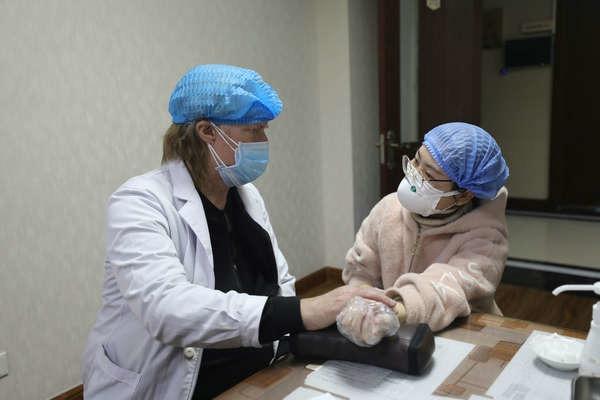 John Cary, an American doctor and teacher from Ningxia Medical University, feels the pulse of a patient at the Hospital of TCM and Hui Medicine Affiliated to Ningxia Medical University in Yinchuan, Ningxia Hui autonomous region. (LI PEISHAN / CHINA NEWS SERVICE)
John Cary, an American doctor and teacher from Ningxia Medical University, feels the pulse of a patient at the Hospital of TCM and Hui Medicine Affiliated to Ningxia Medical University in Yinchuan, Ningxia Hui autonomous region. (LI PEISHAN / CHINA NEWS SERVICE)
YINCHUAN-Inside a clinic of traditional Chinese medicine in Northwest China's Ningxia Hui autonomous region, John Cary, clad in medical protective clothing, felt for a patient's pulse, then asked the patient: "Are you suffering from insomnia or having night sweats these days?"
His mentor Tang Lilong, a professor at the Hospital of TCM and Hui Medicine Affiliated to Ningxia Medical University, helped him translate the question into Chinese.
The patient nodded.
Cary then pressed certain acupoints on the patient's back.
Under Tang's guidance, he wrote a prescription for the patient.
He saw off the patient, who said "thank you" in Chinese, which he understood and smiled.
The 63-year-old American is a volunteer doctor at the hospital and offers medical consultation twice a week there. He's a teacher of English, Chinese medicine and medical English at the Ningxia Medical University.
"I'm unable to help on the front lines, but I can still relieve the pain of patients here and help them relax," he says.
Cary is from LaGrange, a small town south of Atlanta in Georgia. Three decades ago, he had a serious headache and took a lot of medicine that did not work. He took a friend's advice and, through acupuncture, his headache was cured by a doctor of oriental medicine in Atlanta.
"So I quit my job and began to learn TCM from scratch," he recalls.
After he got a dual degree in TCM and acupuncture at a TCM college in Texas, he opened clinics in Texas, Alabama and Georgia.
"All of my patients were American. I got very busy because I was getting results that other doctors were not," he recalls, recounting that he had to fly or drive to work in four locations every week, gaining lots of TCM experience.
After more than a decade of this, he got tired of working every day with little vacation time, so he changed tack and became a teacher. Before coming to China, over the course of many years, he taught in South Korea and Iraq.
"I've been here for about five years and lived in four cities in China," says the teacher, who adds that he's happy to come "home" to the birthplace of traditional Chinese medicine.
"I'm always learning Chinese medicine. It will not cure everything. Western medicine will not cure everything, but together they can do a lot of good," he says.
During the novel coronavirus epidemic, he offered to contribute as an intern TCM doctor at the hospital.
Tang says that, over the past month, he has found that Cary has some good insights when feeling the patient's pulse and performing acupuncture.
"John volunteered to help at the hospital, and we were all very touched. I really want to help him progress further in TCM treatment," says Tang.
Patients seeking TCM treatment were skeptical at first, when they saw a foreign doctor taking their pulses. However, when they heard his diagnoses that matched their symptoms, they were convinced.
Moreover, Cary seemed to have another edge. "John is very good at psychological counseling. Many patients told me they felt very relaxed after talking to John," Tang says.
Cary's apartment is about a 10-minute walk from the hospital. As residents have been advised to stay indoors to curb the spread of the virus, he stays at home most of the time.
"I write books and watch movies. I exercise. I have a good fitness room in my house," he says. "I never get bored."
He says that the university has been looking after the faculty members. "They brought us food. They told us to take our temperature every day and send it to the school," he says.
"The virus has one job: survival. We have one job: survival. One has to be stronger than the other, but it can change quickly," Cary says. "Do not let your guard down because if you do, the bug will win."


